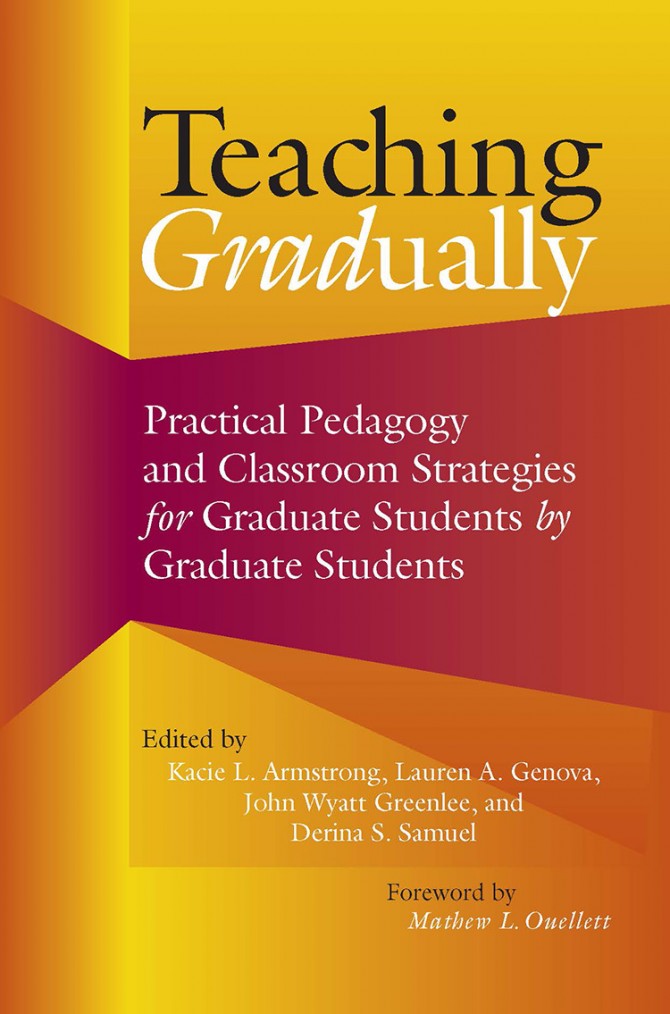News directly from Cornell's colleges and centers
Teaching Gradually: book shares classroom strategies with new graduate instructors
New graduate teaching assistants or early-career faculty members often find teaching daunting as they prepare to step into the classroom for the first time. Knowing what to expect in the classroom and having a set of strategies for addressing situations as they arise comes from experience.
“Teaching Gradually: Practical Pedagogy and Classroom Strategies for Graduate Students by Graduate Students” is a new volume that addresses the apprehension new instructors may feel. It does so from a novel perspective; it is a guide to teaching in higher education for graduate student instructors written by graduate students with substantive teaching experience.
Edited by former Center for Teaching Innovation (CTI) graduate teaching fellows Kacie L. Armstrong PhD ’20 - visiting assistant professor of psychology at Bowdoin College, and Lauren A. Genova PhD ’20 - assistant professor of chemistry at the University of Delaware, and John Wyatt Greenlee PhD ’20, together with Derina Samuel, CTI associate director for graduate student development, “Teaching Gradually” focuses on diversity and inclusive teaching, as well as the growing importance of online learning.
To lead from the perspective of diversity and inclusion, the editing team allowed the authors to have a strong influence on the direction of the book itself.
“We focused on what they were interested in talking about and what they wanted to share with other graduate student instructors,” said Genova. “As a result, the book evolved as we received and evaluated the content from our authors.”
“It is their story, and they truly want to make a difference for other graduate instructors,” said Samuel of the contributing authors.
Allowing authors to participate in structuring the book not only led to including a broader range of perspectives from young educators but also helped create a sense of proximity with the intended audience. Through that proximity, it offers a collaborative approach to professional development for graduate students.
“We wanted to eradicate the power dynamics between senior instructors and new graduate instructors with the way the book is set up,” said Armstrong. “We were also hoping to build a sense of camaraderie or community among graduate student instructors to make readers comfortable with the idea of trying these strategies.”
The wide range of voices from institutions of higher education throughout North America was intentional to produce a resource useful to as many readers as possible.
“The variety of disciplines represented on the editing team contributed to ensuring a broad-based volume applicable to graduate teaching as a whole,” said Greenlee.
The resulting content explores the science of learning, instructional roles common across higher education, building inclusive learning environments, assessing learning, and strategies for teaching research skills as well as ideas for professional development. “Teaching Gradually” provides a comprehensive overview of the teaching experience for graduate instructors as well as giving them concrete strategies that they can try out in the classroom.
For the editors, reviewing the content they selected for “Teaching Gradually” was a learning process as well. As graduate students themselves at the time, it was as much about expanding their own knowledge of teaching as sharing their experiences with other young instructors.
“I know that my teaching has changed just by reading through the chapters our authors submitted,” said Armstrong.
Samuel also helped the editing team ensure the book represents the current, evidence-based teaching approaches CTI advocates in its work with instructors.
Media Contact
Get Cornell news delivered right to your inbox.
Subscribe